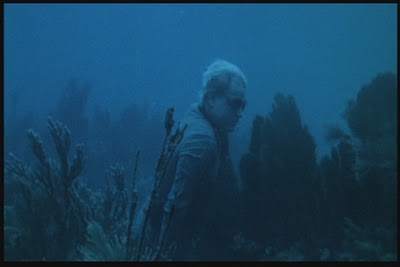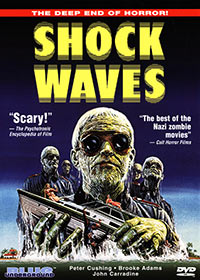Shock Waves is a 1977 horror movie about underwater Nazi zombies. To my knowledge there is as yet no movie about underwater KKK zombies, or underwater Islamic terrorist zombies. Both of those groups wear little white robes, and the last thing you want is a Jaqueline-Bisset-in-The–Deep situation with those guys. Nobody wants to see hateful racist zombies in wet T-shirts, not even horror movie fans who crave the most horrific sights.
I’m being silly, because that’s what I do, but this is actually a sweet little horror flick. Shot on a micro-micro-budget, Shock Waves is an ingenious attention-getter on the part of director/co-writer Ken Wiederhorn and his crew. If you’re going to make a movie for almost no money, this is an enviable business model.
The setting, a passenger boat which docks on a tropical island where a mad scientist has been concocting his evil experiments, farming out a breed of goose-stepping zombies who can walk underwater. Florida was a thrifty stand-in for the tropics. It’s like Lost meets Dawn Of The Dead! (Said the obnoxious film executive who lives in my brain.) There are also people you might even recognize in the movie — Brooke Adams, from Days Of Heaven, plays the ingenue…
Luke Halpin, the kid from Flipper, all grown-up and sort of working on a mullet (“The Floridian”), plays her possible love interest. John Carradine, the acting legend, John Ford regular, and patriarch of the acting Carradines, plays the crusty old sea captain…
And Peter Cushing, famous to some from his work in the Hammer horror films and famous to everyone else from Star Wars, plays the mad German scientist.
In the DVD package that the incredible DVD/Blu-Ray company Blue Underground put out a while back, Ken Wiederhorn explains how he had Carradine for the first half of the movie (SPOILER ALERT: his character doesn’t make it to the island) and Cushing for the second half — that way, audiences always had a famous face on screen. This is just one of the many clever and economical filmmaking decisions that the aspiring filmmakers among us can learn from.
Another lesson is that good horror doesn’t have to be complicated to be effective. Shock Waves is made up of a few very basic elements which are spread over a brief but memorable running time. In the first moments of the movie, a young woman in a bikini (there’s a decent reason for it) is found in a small boat by fishermen at the beginning of the movie. In voiceover, she talks about how only now can she remember what happened to her.
The story then begins in earnest, on the boat, where a celestial event re-awakens the zombie scuba-divers of the S.S. (Good idea for an alternate grindhouse title?) Between the time that the boat arrives on shore and the inevitable zombie siege of the island transpires, Shock Waves is almost entirely atmosphere. It turns out that there is a ton you can do to creep an audience out with a pack of six or seven unflinching Aryan uniformed creeps standing around in an incongruously tropical location — particularly with an electronic score as ominous as the one by Richard Einhorn, which will make fans of the scores of John Carpenter and Goblin very happy.
The fun of this movie is in the effect created by the union of the inventive framing, the glacial pacing, the excellent score, and the dead-serious treatment of a truly wackadoo premise. It’s really creepy and entertaining to put this movie on and zone out. For me personally, older and less-polished movies like this one are way more effective than newer, more so-called-flawless horror movies. (This is an opinion you are sure to hear from me again.) I think the more of a temporal remove, the more ruddiness and dust and rust in the frame, the more legitimate the movie seems to be. Take a look at the following stills and tell me if you’d rather watch a movie like this one, or a more recent, prettier movie like Scream 4…
Right?
This is fun stuff, although at this point there’s not much left to say about the movie. I’m not spoiling much when I say that the bulk of the movie becomes a typical process of attrition. The zombies wipe out all the breathing people. Their preferred method of murder is by drowning — these guys grab you and push you underwater, which is an eerie way to go, but maybe not as much the fourth or fifth time. These aren’t the most innovative of seafaring Nazi zombies, forty years spent marinating in salt water or not. Ultimately, the last to survive, as we knew from the start, is Brooke Adams’s character, who is marooned on a life boat, found by those fishermen, and taken back to civilization.
As she recuperates in her hospital bed, she writes in her journal, resuming her voiceover. She narrates how she can only know begin to remember what happened to her. Then she says it again. Then again. And again. Then we get a look at what she’s been writing, which is all illegible scribbles, “all work and no play” style, and we realize that she’s been driven entirely insane by her vacation with the undead. It’s a cool little tag for an underrated and little-known movie.
Even though I’ve just talked about the ending, Shock Waves will still probably surprise you. Like I said, it’s more about the vibe than the specifics, and if you’re a fan of unusual films, be they horror or otherwise, the vibe is one you can groove to.
Pick up Shock Waves from the Blue Underground website! (It’s cheap!)
And ‘follow’ me on Twitter!















